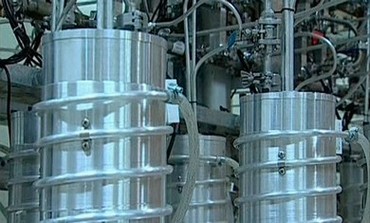August 6, 2014
by Jerusalem Post staff

by Jerusalem Post staff
Centrifuges unveiled in Natanz Photo: REUTERS
Israel is capable of carrying out a unilateral military strike against Iran's nuclear facilities without operational support from the United States, a senior Israeli official said to Israel Radio on Tuesday morning.
Although, such a strike would render less effective than one conducted by America, the unidentified official said.
The diplomatic official doubted US intentions to prevent Iran from acquiring nuclear weapons at all costs.
American conduct regarding Syria, contrary to declarations by President Barack Obama, shows Israel that it cannot rely on US assurances, the Israeli source said.
Israel fears the development of direct negotiations between Washington and Tehran would ease sanctions on the Islamic Republic in exchange for concessions, and would not satisfy the requirements imposed by Israel, the unnamed official added.
Jerusalem and Washington differed on Sunday over the significance of Iranian President Hassan Rouhani’s inauguration, with Washington ready to work with Iran and Jerusalem warning that the new regime – like the old – is a threat to world peace.
The US hoped the new Iranian government would “heed the will of the voters by making choices that will lead to a better life for the Iranian people,” White House spokesman Jay Carney said in a statement shortly after Rouhani was sworn in.
This conciliatory tone was at odds with the tone coming from Jerusalem, where Prime Minister Binyamin Netanyahu again urged the world not to be “taken in” by Rouhani’s perceived moderation.
“On Friday, the Iranian president said that Israel ‘has been a wound on the body of the Islamic world,’” Netanyahu said at the opening of the weekly cabinet meeting.
“The president of Iran has been replaced, but the goal of the regime has not been replaced, it remains as it was,” he continued. “Iran’s intention is to develop a nuclear capability and nuclear weapons in order to destroy the State of Israel, and this constitutes a danger not only to us and the Middle East, but the entire world, and we are all committed to prevent this.”
Michael Wilner and Herb Keinon contributed to this report.